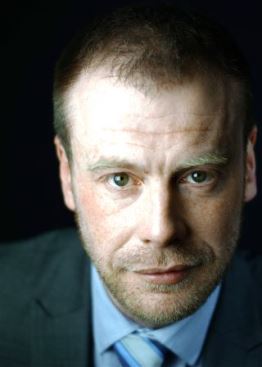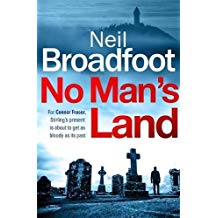Neil Broadfoot’s
breakneck debut, Falling Fast, introduced Edinburgh investigative journalist
Doug McGregor and his police contact, DS Susie Drummond. Widely praised by
critics, crime fiction authors and readers alike, it was shortlisted for both
the Dundee International Prize and the prestigious Deanston Scottish Crime Book
of the Year Award, immediately establishing him as a fixture on the Tartan Noir
scene.

Your
previous three books were set in Edinburgh, why the move to Stirling?
Like
most of my writing, it was completely random. I was happily working away on the
next Doug and Susie book set in Edinburgh, when I went to the Bloody Scotland
crime festival in Stirling. As you know, one of the mainstays of the weekend is
the Scotland v England crime writers football match that takes place at the
bowling green at Cowane’s Hospital at the top of the town. I was sitting watching the match and suddenly, as
happens, the thought occurred to me that this would be a great place to dump a
body.
From
there, my imagination took off, and before I know it I had a copper standing at
the crime scene, listening to the squeal of a spike swaying in the wind. I took
the idea and went for a walk around Stirling, and it was like seeing the place
for the first time. I could dump a body here, someone could live there, this
could happen here. With all the bloody history of Stirling, it made perfect
sense. So I wrote up the scene I had seen and the story kept on calling me, and
the switch to Stirling was made. Though I am still getting asked about Doug and
Susie…
You
had a reporter as a central character in the previous novels and you have
another in No Man’s Land. Does your own
previous career as a journalist lead you down this path, or are they a way of
opening out an investigation and story that might not be possible by keeping to
Police procedure?
As
I never plan or plot anything, it’s probably my way of making sense of what the
story is trying to tell me. You’re right, I spent 15 years as a journalist, and
that taught me how to approach stories in very specific ways, how to research,
the questions to ask. With a murder like the first one in No Man’s Land, it
would only be natural that there would be a lot of headlines and reporters jostling
for coverage. Which got me thinking, what if there was one reporter who was
jostling harder than others, who was more motivated to get the exclusive? And
from there, Donna Blake was born.
You
make fine use of the open and hidden sectarianism in Scotland, but how
prevalent is that within the current political landscape of Scotland?
Sectarianism
is, unfortunately, something that’s been in Scotland for centuries, it’s almost
part of the landscape, particularly in some sections of our sporting life. In
politics, it’s a different kind of division, not along religious lines but
ideological ones. And in Scotland, the big one at the moment, being fuelled by
Brexit and the catastrophe at Westminster, is independence. Like most things,
the debate is on a spectrum, which swings from considered and measured to
positively evangelical. It’s understandable given the stakes, but it can make
the debate ugly. Unfortunately, with the way things are going, I don’t see it
being resolved any time soon.
Your
central character in No Man’s Land, Connor Fraser, is a
former Police Service of Northern Ireland (PSNI) officer, now working in close
security. Why him?
When
I got the intro to No Man’s Land, it became apparent very quickly that
the protagonist was going to be dealing with some nasty people and extreme
violence. So I needed someone who could handle himself, someone who was
trained, was familiar with firearms and would act decisively. The training that
officers with the PSNI go through matched what I wanted for Connor, and I love
Belfast, it’s a city I’ve spent a lot of time in. I always wanted to write
about Belfast, so this gave me the opportunity to do that.
You
have a wife, two young children and three dogs, so must have a busy and
sometimes noisy household. How do you structure your writing day to have some
sort of work/life balance?
I
mostly write at night, but squeeze in what I can, when I can around that.
Luckily enough, my wife was a journalist as well, so she understands when I say
I’m on a deadline and disappear for hours on end. I joke that writing is work
that never feels like a job, but at the end of the day it is just that, a job.
You’ve got to have the discipline to keep going back to the work. Luckily, that
gets easier for me the further I get into a book and the more lost I get in the
story, as I want to know what’s happening as badly as the reader!
You’ve
spoken about A Study in Scarlet and McIlvanney’s
‘Laidlaw’ books as being touchstones and also been fulsome in your
praise of a number of modern day Scottish writers. Are there any Welsh, Irish
or English crime writers that you get excited about when you hear they have a
new book on the way?
God
yes. One of the great thing about crime writing at the moment is that there are
so many great writers out there producing outstanding work. For my sins, I’m
not too familiar with Welsh writers, but anything from Irish writers such as
Stuart Neville (The Twelve just blew me away), Adrian McKinty (the Duffy
series) or Steve Cavanagh (who wrote it out of the park with Thirteen
and Twisted) always goes to the top of my TBR pile. From England, Alex
North is going to set the world on fire with The Whisper Man, Tony Kent
is set for stardom, Derek Farrell’s Danny Bird series is an utter delight that
brims with heart and Mark Billingham can, in my view, do no wrong. Oh, and
going back to Scotland for a second, Douglas Skelton’s Thunder Bay is
going to be a busy book come awards season, and Helen Fields’ Perfect Crime
is practically perfect….
Whilst
you been writing with a male central protagonist, there is always a strong and
involving female character within your books. You obviously feel that having
that element within your stories is essential and do you enjoy writing from a
female perspective?
The
funny thing is that I don’t see myself as writing from a female perspective,
I’m writing a character that happens to be a woman. I think it’s important that
all characters are fully rounded and believable people, each with their own
struggles.
One
thing I hate in crime fiction, and in TV or films as well, is when a female
character is only seen as a plot device rather than a person. For example, the scantily
clad body that’s found draped across the grave who the strong male hero vows to
get justice for. It’s cheap and demeaning, so I’m always conscious that every
character, male or female, has to be properly fleshed out.
Returning
to journalism, did your previous career nudge you in the direction of the
political shenanigans in No Man’s Land, or was it an
opportunity to shine a light on something well known, but seldom talked or
written about.
I
think it was more that I was reacting to everything that’s going on in the news
and current affairs right now. Stuart MacBride once said that, if you want to
get a sense of what’s going on in the world in a specific time, read the crime
fiction from that time, and I think that’s right.
Writing
contemporary fiction you’ve got to reflect the world we’re living in, and the
world we’re living in at the moment is utterly insane. As a journalist who
spent a lot of time covering politics, it fascinates and terrifies me in equal
measure. So yeah, there were questions I wanted to ask and attitudes I wanted
to expose, and these found their way into the book.
Last
question. You have a dinner party for yourself and five other authors, dead or
alive. Who would the five be and why?
You
don’t like to make it easy for a writer, do you? Tough question. I’d love to
sit down with Conan Doyle and meet the man behind the myth. Same with Stephen
King, he’s been a hero of mine for as long as I can remember and his work
inspired my early dabblings with horror. Helen Fields would have to be there as
my drinking companion for the night (that woman is lethal with Jameson and gets
me into all sorts of trouble), Craig Russell would be a must (I’ve had dinner
with Craig and the man can cook!) Lastly, I’d have to invite Mick Herron along-
the Jackson Lamb series is just sublime, and I’d love to talk about that with
him – hopefully with better table manners on show than those displayed by
Jackson!
Read
Andy’s review of No Man’s Land
here

Constable, Paperback 11 Apr 2019